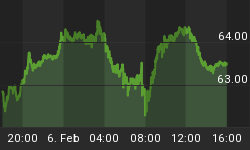In the early days of the American republic, fortune seekers were urged to "Go west young man!" Unfortunately, with the American economy now clearly showing its fragility, the rallying cry for today could be, "Go abroad!"
In the past quarter century, the center of wealth creation has steadily moved away from the United States and towards new foreign competitors, especially the so-called "BRIC" countries of Brazil, Russia, India and China, where economic growth rates have greatly eclipsed the U.S. In recent years, this economic might has translated into much higher returns on their respective stock markets. These movements are creating a wave of real wealth that wise American investors cannot afford to miss.
In the mid 1970's, a transformation began in which the driving force of the American economy shifted from 'producers' to 'consumers'. Today, as measured by the GDP, consumption accounts for some 72 percent of the American economy. It is no wonder then, that as economics is so synonymous with spending, that the recently passed "stimulus package" is skewed heavily (90%) in favor of the consumer (where the votes are) at the expense of producers.
But after a generation of consuming more than it has produced, America has dissipated vast amounts of its wealth.
Unwilling to allow the citizenry to confront the reduced living standards that such dissipation requires, successive American governments have instead produced consumer booms in technology and real estate. Inflated through a combination of deficit spending, borrowing and massive depreciation of the U.S. dollar, the bubbles created by these policies have left future generations of Americans saddled with vast debts and an anemic currency.
But while America has lost much of its wealth, the rest of the world has gained. Since the late 1980's, a wave of economic enterprise has swept across the world. Under the leadership of the Reagan-Thatcher-Gorbachev triumvirate, communism melted, opening the world to free trade, and brought some 2 billion new consumers to the market. It also brought some 2 billion hard-working, low cost producers into direct competition with the developed West.
Today, Western consumers not only buy their clothes, toys and sneakers from BRIC factory workers, but they are also likely to use service workers in those countries to manage help-desk call centers, prepare tax returns and read X-rays. As a result, growth rates in BRIC countries skyrocketed and corporate profits and stock prices followed suit, far outstripping the average performance of U.S. stock markets.
The benefits of the great, new world consumer super boom have flowed mainly, as should be expected, to 'producer' nations. As an example, the S&P 500 Average Index rose by some 14 percent gross in 2006 (Incredibly, some 80 percent of mutual fund managers failed to equal even this return). Further, when deductions were made for management fees, transaction costs, 3 percent inflation and the depreciation of the U.S. dollar, many American investors actually experienced a 'real' net loss in that year. By contrast, the stock markets of BRIC offered far superior yields in appreciating currencies with Brazil up 33%, India 47%, Russia 71% and China 131%!
One major impact of the increased manufacturing power of the BRIC nations, and even smaller countries like Vietnam, is a greatly increased thirst for raw materials. As formerly impoverished populations gain wealth, demand for higher quality food impinges upon the established demand of the 'mature' markets. These two factors have greatly benefitted nations such as Canada, Australia and New Zealand that provide raw materials, energy and food.
As a result, perhaps a more appropriate and meaningful pneumonic device for international investors would be BRIC JACS (Brazil, Russia, India, China, Japan, Australia, Canada and the Smaller nations, such as Singapore, Vietnam and New Zealand).
American investors face a difficult situation. While the American economy has slowed almost to recession and a property debacle and massive de-leveraging still threaten, the economies around the world are still booming. The solution is clear; Americans must "Go abroad", if not with themselves than at least with their wallets. Investment portfolios should be constructed not just of BRICS, but also of the JACS which largely hold them together.. macro-economic mortar so to speak.
The true dimensions of the changes heralded by the end of the Cold War are only now becoming clear. The world looks headed for a gigantic economic boom. Massive economic prizes will go to the 'producing' economies. Economies that produce less than they consume can expect some economic and political shocks. Investors should beware and construct their portfolios accordingly.
For a more in depth analysis of our financial problems and the inherent dangers they pose for the U.S. economy and U.S. dollar denominated investments, read Peter Schiff's book "Crash Proof: How to Profit from the Coming Economic Collapse." Click here to order a copy today.
More importantly, don't wait for reality to set in. Protect your wealth and preserve your purchasing power before it's too late. Discover the best way to buy gold at www.goldyoucanfold.com, download our free research report on the powerful case for investing in foreign equities available at www.researchreportone.com, and subscribe to our free, on-line investment newsletter at http://www.europac.net/newsletter/newsletter.asp.















